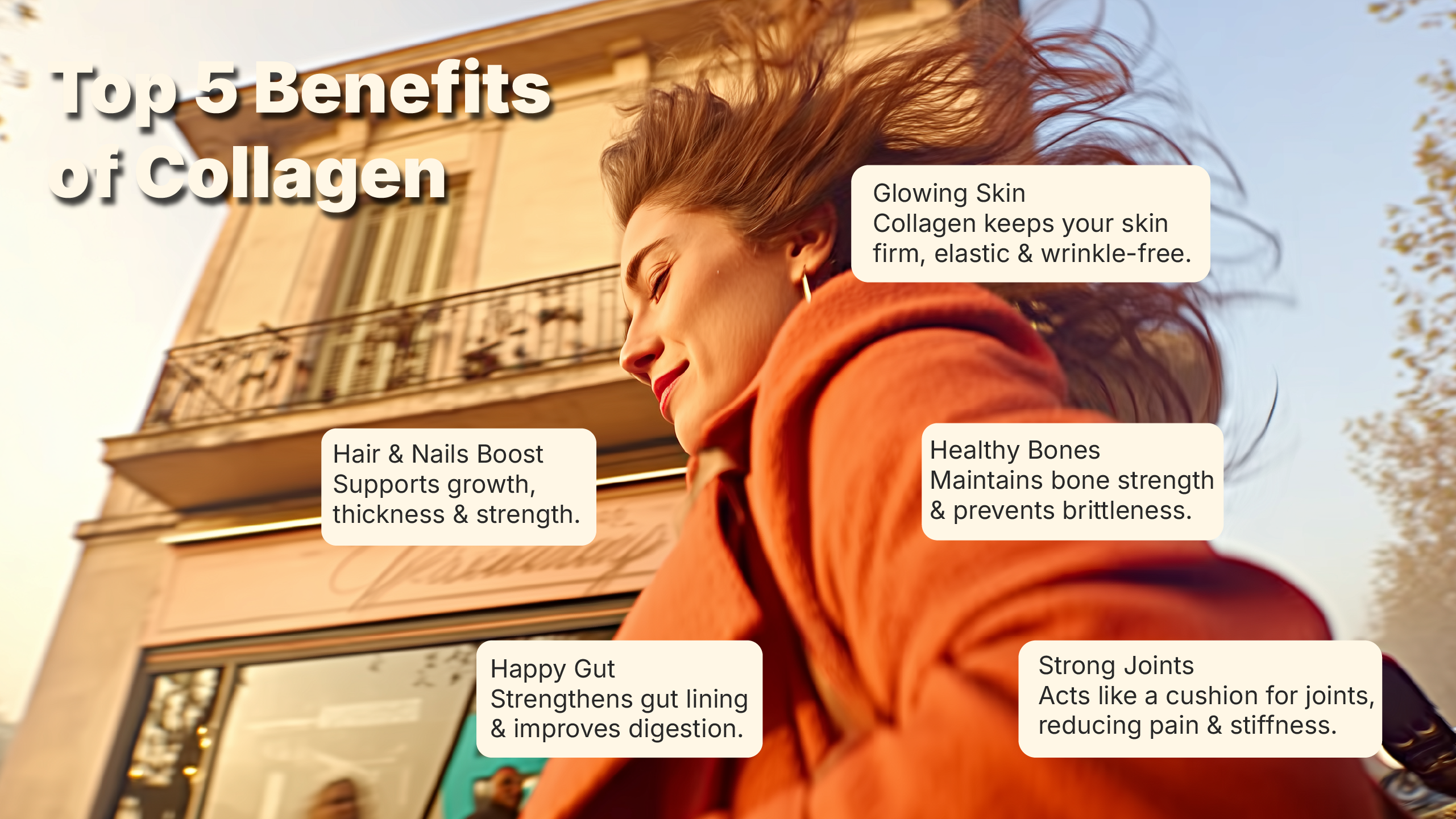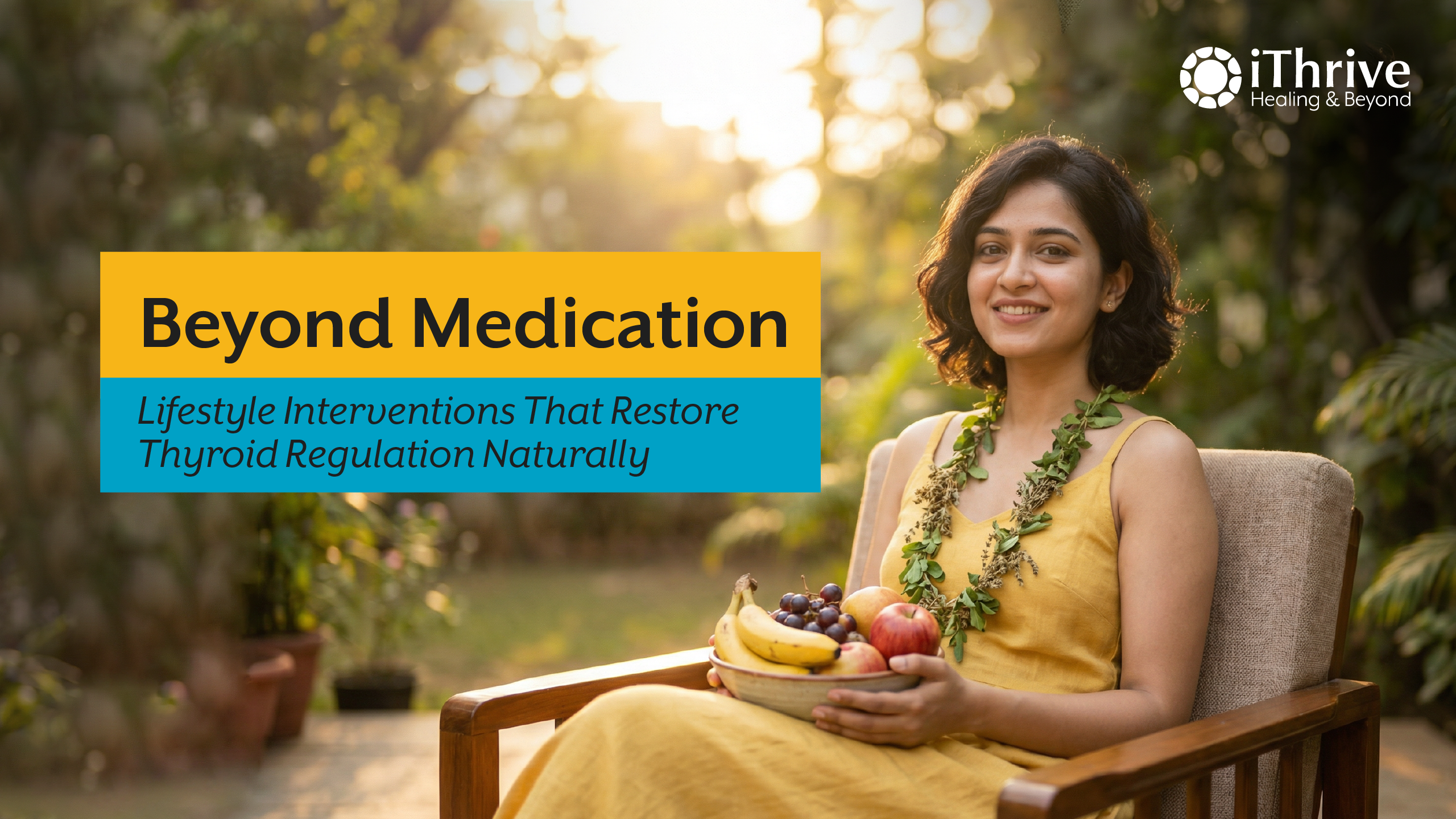Collagen is everywhere these days. People are calling it the best secret to younger skin, stronger joints, and even a better gut. It's in everything from skin care serums to health pills to smoothie enhancers. But in India, where many individuals consume mostly vegetarian cuisine, the real question is: Can your body make enough collagen without consuming animal-based foods?
What is collagen, and why is it important?
The human body has a lot of collagen, which is a structural protein. It makes up the base of your skin, joints, tendons, ligaments, and gut lining. It's like the glue that keeps everything together.
As you get older, your body naturally makes less collagen. This starts in your mid-20s and speeds up with things like a nutrient deficient diet, stress, chemicals in the environment, and inflammation. This causes indications of age, such as joint discomfort, delayed recovery, gastrointestinal problems, and wrinkles.
To maintain or restore these important functions, you must consistently provide your body with the essential ingredients it needs to produce collagen.

Can a vegetarian diet give you these raw materials?
A vegetarian diet can give you some of the cofactors your body needs to make collagen, such as vitamin C, zinc, and copper. However, it doesn't have collagen itself or the whole amino acid profile your body needs to make it the best way.
Collagen is only present in tissues that come from animals, such as bones, tendons, skin, and cartilage. Glycine, proline, and hydroxyproline are the amino acids that make up most of collagen. They are found in very small amounts in plant meals and generally not in the right proportions to start strong collagen production.
Why Plant Proteins Don't Work
Most plant proteins are missing one or more necessary amino acids, which makes them incomplete. Legumes and grains together can give you a more comprehensive profile, but glycine and proline, which are important for collagen, are still not as high.
Plant-based meals also include antinutrients, like oxalate, phytates and lectins, that can make it harder for the body to absorb collagen cofactors like zinc and copper.

What vitamins and minerals are needed to make collagen?
Your body needs three primary types of nutrients to produce collagen:
1. Amino Acids: Glycine, Proline, and Lysine
These are the fundamental building blocks of collagen. Plant-based meals do include certain amino acids, but they don't have much glycine and proline, which are present in bones, cartilage, and skin from animals.
2. Vitamin C
This vitamin helps make collagen by acting as a cofactor, turning amino acids into stable collagen fibers. Vegetarian diets are great for getting vitamin C, especially if they contain foods like amla, guava, or citrus fruits.
3. Copper and Zinc
These are important for enzymatic activities that help make and keep collagen stable. Plant foods like pumpkin seeds, sesame, and lentils have zinc in them, but it may not be as easy for the body to use as it is from animal sources.
What foods are good for collagen?
A diet that supports collagen isn't only about powders or magical supplements. It's about how you constantly feed your body the correct building blocks and safeguard those nutrients by preparing them carefully.
1. Give whole proteins with the full amino acid profile first priority.
Amino acids, mainly glycine, proline, and hydroxyproline, make up collagen. Without these essential components, your body can't make collagen. That's why it's important to eat complete proteins, which have all nine of the amino acids your body needs.
Eggs, poultry, red meat, and fish are all great sources of animal-based proteins. If you don't eat meat, you should make sure you're receiving all the amino acids you need to make collagen by combining diverse plant-based foods, such as lentils with rice or chickpeas with quinoa or take supplements like iThrive Essentials EAA. Your body can't make or fix collagen structures in your skin, joints, or connective tissues without them.
2. Eat a lot of fresh, raw fruits and vegetables to receive vitamin C.
Vitamin C is very important for making collagen. It helps the enzymes that stabilize and cross-link collagen molecules work. Collagen production slows down a lot when you don't get enough vitamin C. This is why scurvy, which is a serious vitamin C shortage, causes wounds to heal slowly and weakens skin.
To make sure you're helping this important process, be sure to eat fresh, raw fruits and vegetables on a daily basis. Good sources include citrus fruits like oranges and lemons, berries, amla (Indian gooseberry), bell peppers, guava, kiwi, and fresh herbs like parsley. Vitamin C is sensitive to heat, so try to eat it fresh every day. Cooking them might destroy the vitamin.
3. Whole foods are a good source of important minerals like zinc and copper
Zinc and copper are trace minerals that help make collagen. Zinc is needed to turn on enzymes that help make collagen and fix tissues.
Copper helps cross-link collagen and elastin, which makes skin and tissues strong and flexible.
Eating healthy unprocessed is the best way to get both of these minerals. Pumpkin seeds, shellfish, red meat, lentils, and eggs are all excellent sources of zinc. You can get copper from organ meats like liver, sesame seeds, dark chocolate, and mushrooms. The easiest approach to get these important cofactors into your body naturally is to eat a wide variety of foods that are high in nutrients.
4. To preserve nutrients, avoid cooking at high temperatures too frequently
Grilling and frying may improve food taste, but these high-heat techniques can damage nutrients that promote collagen, such as vitamin C and certain amino acids.
Instead, use less harsh cooking methods, such as:
- Steaming keeps most water-soluble vitamins, such as folate and vitamin C.
- Slow cooking: This method breaks down bones and connective tissue without destroying them, allowing amino acids and minerals to be released.
- Sauteing at a low to medium heat: This keeps beneficial fats and proteins from getting too much oxidative damage.
5. Don’t Rely on Just One Nutrient: Support the Whole Ecosystem
It needs more than one nutrient to make collagen. Vitamin C, zinc, copper, sulfur-containing amino acids, antioxidants, and more are all needed to make this happen. Your gut health is also very important. If your digestion isn't working well, you won't be able to absorb the amino acids and minerals you need, no matter how healthy your diet seems on paper.
To get the most out of your body's ability to make collagen:
- Eat a lot of different, colorful, and seasonal fruits and vegetables.
- Add healthy fats to help cell membranes and lower inflammation.
- Eat fermented foods and fiber, and drink enough water to keep your gut healthy.
- Avoid too much sugar, processed seed oils, and alcohol. All of these things can break down collagen quicker than your body can make more of it.

Can vegetarians still receive collagen through supplements?
It's quite difficult to detect changes in your skin, joints, or gut health only by changing your food if you pursue a vegetarian or plant-based lifestyle.
That's when supplements come in. Marine collagen (from fish) and bovine collagen (from cows) are the two kinds that are easiest for the body to use. These supplements give your body the specific amino acids it needs in a form that is simple to digest and use.
Supplements are not required; however, they are commonly necessary for vegetarians who don't eat bone broth or animal-based meals on a regular basis. A clean, well-sourced collagen powder may fill in the gaps well.

Subscribe to our newsletter and receive a selection of cool articles every week





.png)


.webp)

.jpg)
.jpg)










